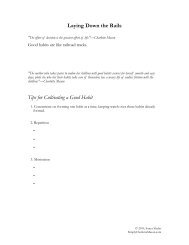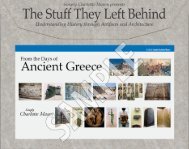book - Simply Charlotte Mason
book - Simply Charlotte Mason
book - Simply Charlotte Mason
Create successful ePaper yourself
Turn your PDF publications into a flip-book with our unique Google optimized e-Paper software.
Mesopotamia, which means “land between the rivers.” Like<br />
the Egyptians, the Mesopotamians depended completely on<br />
their rivers to survive. The Tigris and Euphrates did not flood<br />
with the clockwork regularity of the Nile, but heavy rains in<br />
the winter often brought floods, so that the fields were blessed<br />
with new silt almost every year. As the people began to settle<br />
into villages along the rivers, they dug irrigation channels, or<br />
trenches—long ditches that sucked water out of the flowing<br />
rivers and ran it out into the fields so that the farmers could<br />
grow wheat and barley, onions and garlic and peas, lettuce and<br />
cucumbers.<br />
The first cities began to appear in the south, along the<br />
rivers, in a dry, flat plain that came to be called Sumer. Just<br />
like the early Egyptians, the Sumerians were not one unified<br />
nation. Instead, each city was its own independent kingdom,<br />
with the city at the center, and farmland and villages clustered<br />
around it. Each city was governed by a group of its most<br />
important citizens, who met together regularly to discuss the<br />
city’s problems and settle disputes among the people, and<br />
also to choose the city’s leader. This man was called the lugal<br />
(LOO-guhl), which means “the big man.” These lugals were<br />
the first kings in Mesopotamia. Concerned as they were with<br />
their own power, and with increasing that power by battling<br />
with the cities around them, they did not realize the advantage<br />
of uniting together into one strong nation. This blindness<br />
would lead to their downfall. Because just like Upper and<br />
Lower Egypt needed Narmer to weld them together, the cities<br />
of Sumer needed one man to make them into an empire.<br />
This is how it happened.<br />
The large Sumerian city of Kish was ruled in those days<br />
by a man named Ur-Zubaba (ER zoo-BAH-bah). Like most<br />
ancient kings, he had a cupbearer—a man whose duty it was<br />
to serve drinks at the royal table. This sounds like a very<br />
humble position, but actually the cupbearer was a person of<br />
14 <strong>Simply</strong><strong>Charlotte</strong><strong>Mason</strong>.com

















